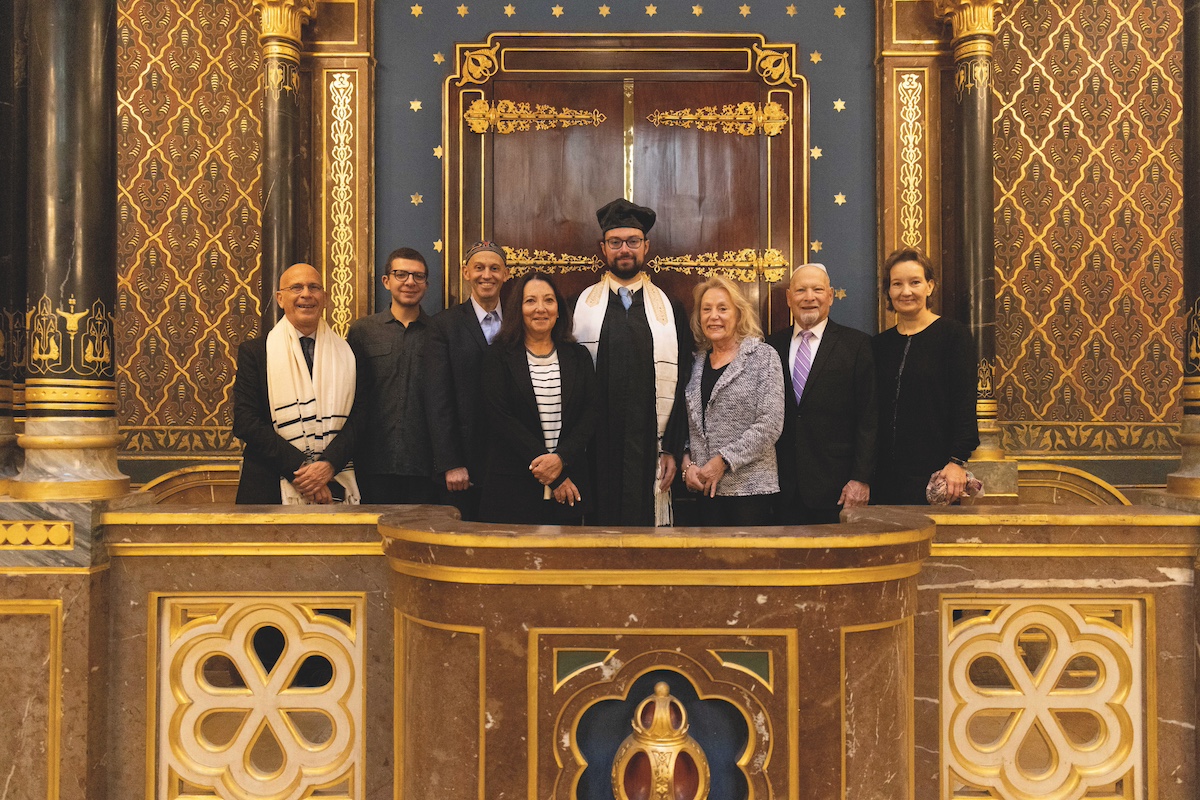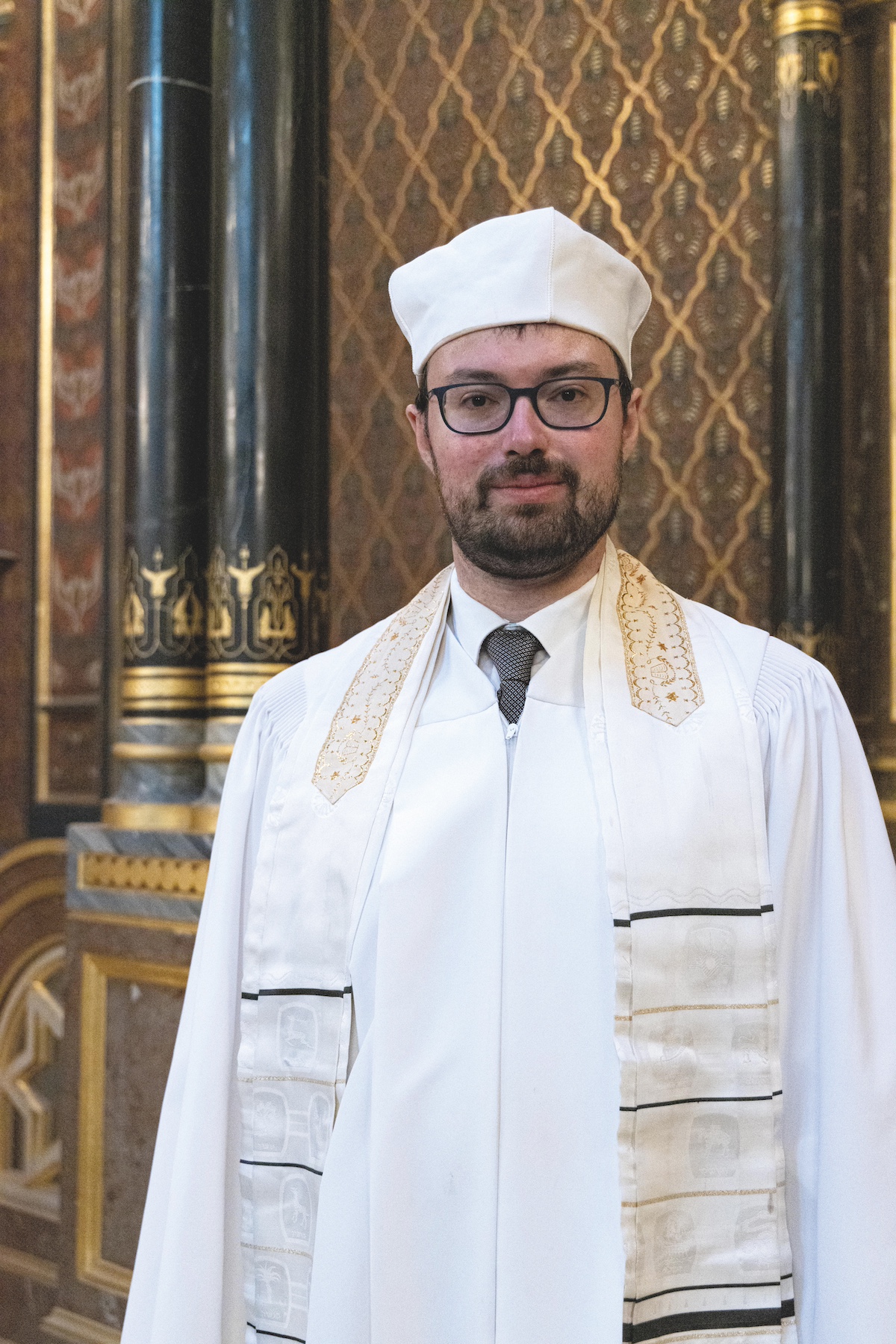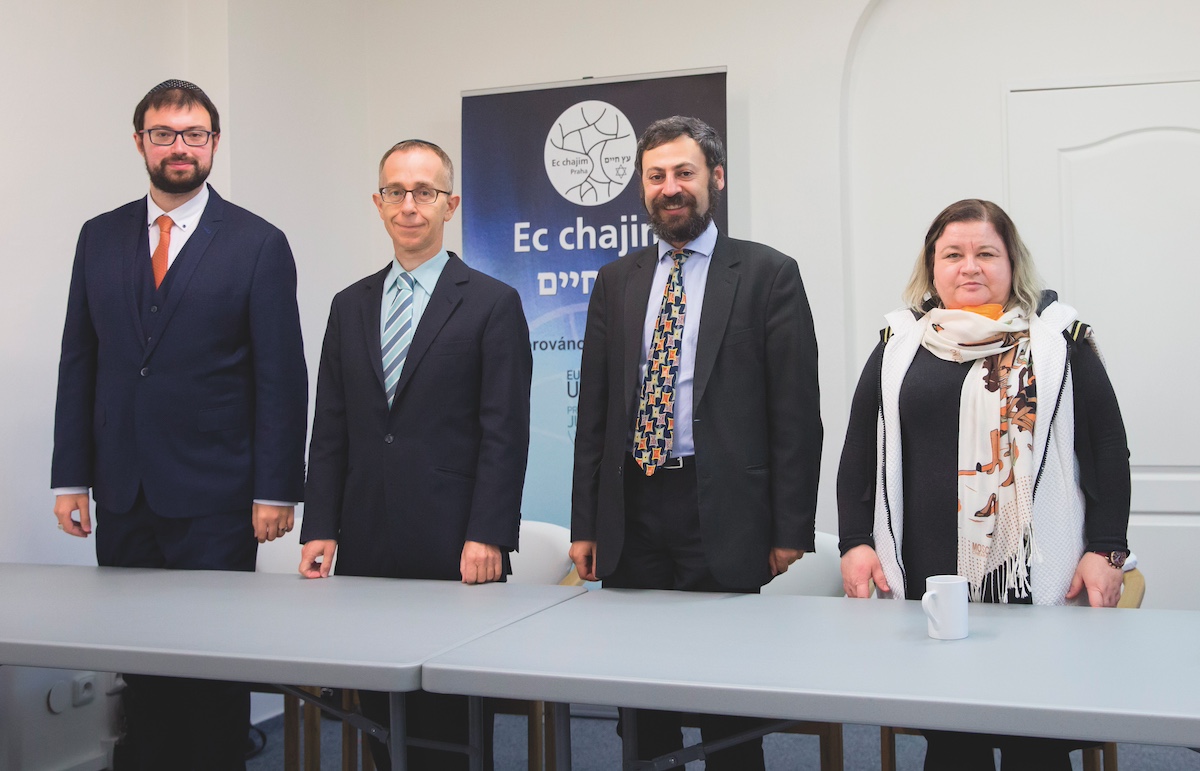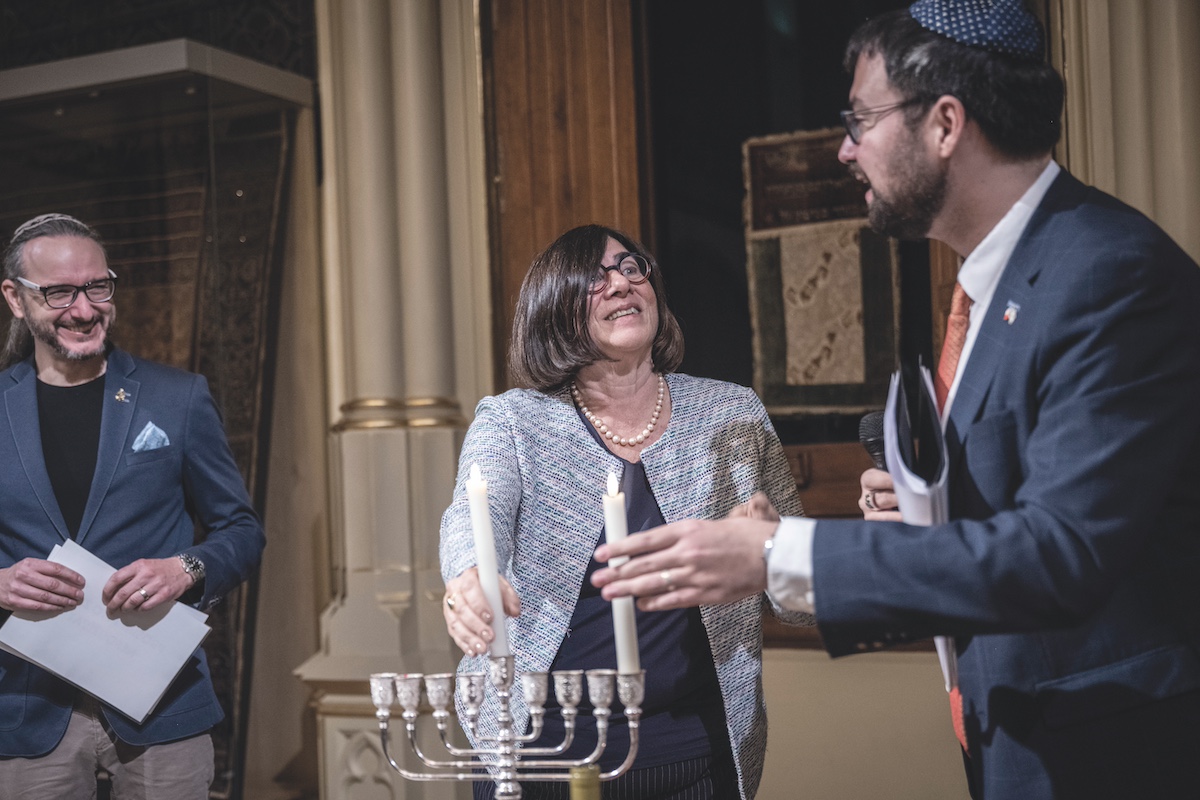“Progressive Judaism embraces necessary changes”

Visit of the delegation of the World Union for Progressive Judaism at the Spanish Synagogue in Prague, from left: Ben Fantini, Vice Chair of the European Union for Progressive Judaism; Andrew Keene, Vice Chair of the World Union for Progressive Judaism; Rabbi Sergio Bergman, President of the World Union for Progressive Judaism; Carole Sterling, then Chair of the World Union for Progressive Judaism; Rabbi David Maxa; Liz and Jim Breslauer; and Sonja Guentner, then Chair of the European Union for Progressive Judaism
(Photo Courtesy: Sheilla Pallay)
Text: Martina Hošková, M.Zisso
“In a world experiencing a pandemic of uncertainty, religious leaders must offer spiritual guidance amidst challenges like war conflicts, climate change, the rise of extremism and totalitarian regimes, and all sorts of crises,” says David Maxa, a Progressive Judaism Rabbi living in Prague. “It’s crucial to note that next to Orthodox Judaism, Progressive Judaism has deep historical roots in the Czech Republic, evident in landmarks like the Spanish Synagogue in Prague, constructed in 1868.”
Can you share an overview of your current roles as the Progressive Rabbi in the Czech Republic, and your leadership positions in various international organizations?
I live in Prague, where I serve as the Rabbi of the Progressive Jewish Community ’Ec chajim’, which I co-founded in 2019. Additionally, I play a role in the Federation of the Jewish Communities in the Czech Republic, supervising the agenda of the Progressive stream of Judaism, and serving as the Rabbi for the Jewish communities in Liberec and Děčín. I also oversee Progressive Judaism in the region; since 2021, I’ve been the Convenor of the Central European Beit Din (CEBD), the rabbinic court for the Progressive stream in the Czech Republic, Hungary, Poland, and Slovakia. In 2022, I became a member of the ROI Community of Schusterman Family Philanthropies, which unites innovative Jewish and Israeli changemakers to address complex challenges in Jewish communities, Israel, and the world. A year later, I was elected an Executive Board Member of the World Union for Progressive Judaism (WUPJ), the international network of Jewish communities, serving an estimated 1.8 million members worldwide in more than 1,250 congregations in over 50 countries.

Rabbi David Maxa at the Spanish Synagogue in Prague (Photo Courtesy: Sheila Pallay)
What factors influenced your decision to become a rabbi?
My father’s survival in the Holocaust profoundly shaped my identity, connecting my Jewish roots with poignant memories. After his passing, I embarked on a journey to explore my Jewish identity beyond the historical context. Studying Jewish Studies at Prague’s Charles University exposed me to the story of Rabbi Richard Feder, who accompanied the Czech Jewish community in Ghetto Terezín, ultimately inspiring me to pursue the path of becoming a rabbi. Along this transformative journey, I was fortunate to connect with individuals whose great inspiration and unwavering support became the cornerstone of my pursuit, which led me to study for the rabbinate in Germany and Israel. Additionally, I had the privilege of undertaking internships in the USA and the UK, broadening my understanding of global Jewish communities.
I achieved my rabbinic ordination in 2020.
Can you elaborate on the distinctions between Progressive Judaism and Orthodox Judaism?
Both streams share common roots, but they began diverging in the 18th and 19th centuries when confronted with the challenges of modernity. Progressive Judaism embraces necessary changes, exemplified by full gender equality in all religious questions, inclusivity of diverse Jewish backgrounds, and recognition of same-sex relationships – in contrast to the more conservative approach of Orthodox Judaism. Despite different approaches, it’s essential to note that both streams also have much in common as they share a commitment to tradition, a love for Judaism, and respect for the Torah. Additionally, it’s crucial to note that next to Orthodox Judaism, Progressive Judaism has deep historical roots in the Czech Republic, evident in landmarks like the Spanish Synagogue in Prague, constructed in 1868 as the centre of the local Progressive community. This historical context enriches our Progressive Jewish tradition with a unique connection to the local history and culture.
In your view, is a rabbi inherently a leader? How does this role evolve over time? Could you provide insights into your daily agenda?
Certainly, a rabbi must be a skilled leader, and the traditional notion of a rabbi solely devoted to study is outdated. As a community rabbi, I actively contribute to development strategies, support fundraising efforts, and initiate outreach projects to meet the evolving needs of our communities. Additionally, a rabbi serves as a leader of services and a spiritual guide. Beyond these roles, I am deeply involved in organizing interfaith and intercultural dialogues, as well as charity events. As an illustration, last November, in collaboration with the Israeli Embassy, our community organised a significant charity event for Kibbutz Kfar Azza in Israel, which was profoundly devastated by the Hamas terror attacks on the 7th of October 2023. The fundraiser received the honour of H.E. Anna Azari, the Israeli Ambassador in Prague, who graciously supported the event with her auspices.
Reflecting on your personal experience, what qualities do you believe are essential for aspiring rabbis?
Well, every rabbi is different, but I would say that every aspiring rabbi must respect Judaism and the Torah, long for knowledge in the broadest sense, do their best to understand the world and its changing needs, and care for people. And what about God? Love for God is truly important, but without approaching God through these previously mentioned skills, one would risk becoming a mere fanatic. Being an empathic listener, eloquent speaker, open-minded thinker, and humble leader are also important features, and sometimes a decent singing voice helps.

Rabbi David Maxa with some members of the Central European Beit Din, from right: Rabbi Anita Kantor from Hungary, Rabbi Misha Kapustin from Slovakia and Rabbi Tomáš Kučera from Germany (Photo Courtesy: Leona Kalvodová)
As the founder of the Progressive Jewish Community ’Ec chajim’, what key elements were crucial in building a successful community from scratch?
A successful start required a clear vision, team synergy, and the ability to analyse demands. I take great pride in our community’s cohesive team, understanding that leadership involves skilfully surrounding oneself with the right people who possess the right kind of skills. My deepest gratitude goes to those who trusted us and invested their time, energy, and financial resources in supporting our vision. This fundamental aspect remains paramount for every new project we launch. It’s important to acknowledge that thriving Jewish communities are essentially masterpieces of philanthropy, reflections of dedication and commitment from those aiming to leave a lasting legacy and support meaningful causes. The ability to effectively convince and inspire individuals to align with the vision becomes a pivotal aspect of community building.
What is your vision for the future of your community?
We are committed to advancing the renewal of Progressive Judaism in Prague. With ’Ec chajim’ experiencing unprecedented growth, our strategies encompass addressing increasing demand, expanding our physical facilities, and diversifying our community’s portfolio of activities. This positive challenge motivates us to explore avenues for expansion and ensure that our community’s evolving needs are met, enabling us to continue thriving.

Chanukkah celebration at Maisel Synagogue in Prague, from left: Jakub Szántó, Czech journalist and writer; H. E. Anna Azari, Ambassador of the State of Israel; and Rabbi David Maxa (Photo Courtesy: Karel Cudlín)
Looking forwards, what do you perceive as the major challenges facing religious leaders?
In a world experiencing a pandemic of uncertainty, religious leaders must offer spiritual guidance amidst challenges like war conflicts, climate change, the rise of extremism and totalitarian regimes, and all sorts of crises. The endeavour to inspire people to lead fulfilling lives despite fears is a constant one, a commitment I make not only as a religious leader but particularly as a father of two children. Furthermore, the duty extends to actively contributing to global improvement and inspiring others to do so, guided by the wise Jewish saying: “It is not your duty to complete the work, but neither are you free to desist from it.” One tangible example involves addressing the unfortunate growth of antisemitism. Collaborating with others, I am working to convince Czech universities to adopt the IHRA definition of antisemitism, a pivotal measure in preventing antisemitism in the future, even though the task proves more challenging than anticipated.

